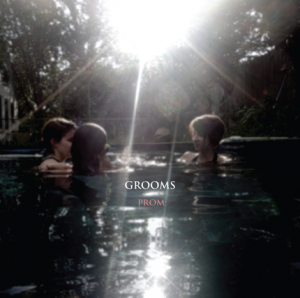Riffs, Rants & Rumors: Grooms Go From Pavement To Peter Gabriel On 'Prom'
posted in: Features • Music News • Reviews & Playlists • Rock
 The Brooklyn-based trio Grooms debuted in 2010 with the album Rejoicer, prompting members of the press to haul out wheelbarrows full of references to ˜90s alt rock, with Pavement and Sonic Youth taking up the most room in the cart. Bandleader Travis Johnson admits that those comparisons were not completely without merit, but his band has moved into other realms with the follow-up, Prom. On this album we definitely moved away from some of the more classic ˜80s and ˜90s American indie-rock influences we’ve used before, he explains, We weren’t really thinking of those bands at all when we were making this record¦ They were probably fairly accurate [as comparisons] before, but they seem less accurate to me now.
The Brooklyn-based trio Grooms debuted in 2010 with the album Rejoicer, prompting members of the press to haul out wheelbarrows full of references to ˜90s alt rock, with Pavement and Sonic Youth taking up the most room in the cart. Bandleader Travis Johnson admits that those comparisons were not completely without merit, but his band has moved into other realms with the follow-up, Prom. On this album we definitely moved away from some of the more classic ˜80s and ˜90s American indie-rock influences we’ve used before, he explains, We weren’t really thinking of those bands at all when we were making this record¦ They were probably fairly accurate [as comparisons] before, but they seem less accurate to me now.
 Where Rejoicer bore a relatively straightforward production style that put the focus squarely on Johnson’s off-kilter guitar arithmetic, Prom is a shadowy record that plays a constant game of sonic hide-and-seek, offering flashes of rich textures that retreat evanescently before you can sink your teeth into them; it boasts a more 3-D approach to the recording process, turning the sounds emitted by Johnson, Emily Ambruso and Jim Sykes into a ghost army of funhouse-mirror reflections, teeming with complex textures and caroming constantly from bristling discord to fragile beauty and back again. So what was in Johnson’s Soundcloud during the making of Prom? For this record we were listening more to things like Broadcast or Tortoise or Peter Gabriel or something, he says. The post-rock references ring true, and what’s more, there’s a quality to the album that recalls the try-anything aesthetic of other, nearly forgotten ’90s acts of that ilk, like Long Fin Killie and Moonshake.
Where Rejoicer bore a relatively straightforward production style that put the focus squarely on Johnson’s off-kilter guitar arithmetic, Prom is a shadowy record that plays a constant game of sonic hide-and-seek, offering flashes of rich textures that retreat evanescently before you can sink your teeth into them; it boasts a more 3-D approach to the recording process, turning the sounds emitted by Johnson, Emily Ambruso and Jim Sykes into a ghost army of funhouse-mirror reflections, teeming with complex textures and caroming constantly from bristling discord to fragile beauty and back again. So what was in Johnson’s Soundcloud during the making of Prom? For this record we were listening more to things like Broadcast or Tortoise or Peter Gabriel or something, he says. The post-rock references ring true, and what’s more, there’s a quality to the album that recalls the try-anything aesthetic of other, nearly forgotten ’90s acts of that ilk, like Long Fin Killie and Moonshake.
But there’s one influence that has left a deeper mark on Johnson’s songs than any band could, and that’s his ongoing struggle with obsessive-compulsive disorder. Johnson has let it be known that much of his music is colored by his experiences with OCD, but going public with that kind of personal information wasn’t a snap decision for him. I actually did have hesitations about it, he says, not because I care about people knowing things like that about me, but because I hate when people exploit things like that. I think I was actually talking to my mom, who also has OCD, and she was just talking about how it’s not exploitative to talk about where the songs are coming from, which is largely through this really thick lens of OCD.
 Of course, none of the listeners”and probably not even Johnson himself”could say how much of the darkness underlying Prom‘s relative dreaminess comes from his psychological issues, but there’s a consistent presence of beauty throughout the record, sometimes lurking just below the brambles, sometimes front and center. We wanted the album to be overall really pretty, Johnson affirms, even when it was noisy or dissonant. There are a couple moments where it’s a bit more straight-up abrasive, on ˜Into the Arms’ or ˜Don’t Worry, You’re Prettier,’ and I think actually, looking back, those were the first songs we wrote for the album, before the aesthetic had come into place, maybe. Emily and I were always drawn to switching between really poppy and really noisy, between really pretty and really ugly, but I think we let the pretty pop stuff through a lot more on this one than we would have before. We got into things being soothing, I think we were just more in the mood to be soothed than jarred, but there were still some rough edges poking through here and there.
Of course, none of the listeners”and probably not even Johnson himself”could say how much of the darkness underlying Prom‘s relative dreaminess comes from his psychological issues, but there’s a consistent presence of beauty throughout the record, sometimes lurking just below the brambles, sometimes front and center. We wanted the album to be overall really pretty, Johnson affirms, even when it was noisy or dissonant. There are a couple moments where it’s a bit more straight-up abrasive, on ˜Into the Arms’ or ˜Don’t Worry, You’re Prettier,’ and I think actually, looking back, those were the first songs we wrote for the album, before the aesthetic had come into place, maybe. Emily and I were always drawn to switching between really poppy and really noisy, between really pretty and really ugly, but I think we let the pretty pop stuff through a lot more on this one than we would have before. We got into things being soothing, I think we were just more in the mood to be soothed than jarred, but there were still some rough edges poking through here and there.
It’s Johnson himself who does a lot of the heavy lifting in terms of determining the instrumental mood of the tracks on Prom, and in that process he brings to bear a seemingly endless array of guitar tones, tweaked for extra ambience by the album’s skillful production. Johnson reports that his broad spectrum of guitar sounds comes from just getting bored really quickly with myself, with wanting to do something I haven’t done before, for better or worse. So I’m always retuning the guitar or wanting the guitar aesthetic to switch, from song to song or part to part. When I was like, seventeen, I just started experimenting a lot with things, just because I was so frustrated with what I was doing with a standard setup.
The band isn’t taking their aural evolution for granted either. Prom marks a major step for Grooms, and they’ve even added a fourth player, guitarist/keyboardist Tyler McCauley, for their live shows, to enable them to recreate the rich sounds of the album tracks onstage. The band has already racked up a number of tours since their first album, but with the release of Prom and the emergence of a bigger, badder live act, it seems that Grooms’ honeymoon period is over, and our real relationship with them is just beginning.
